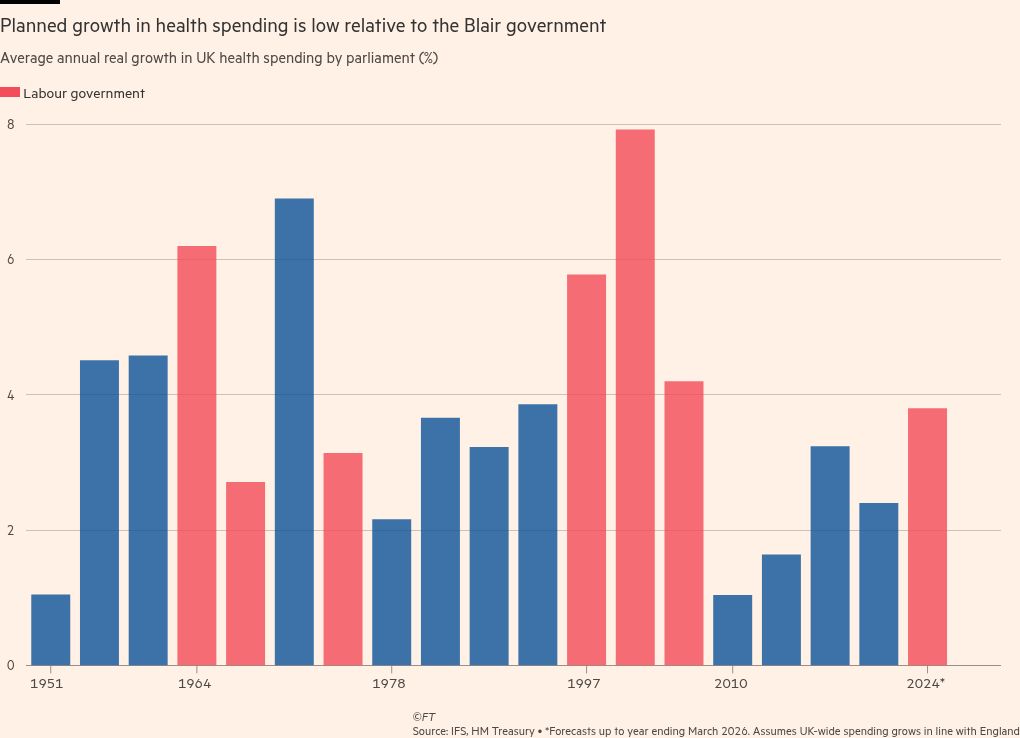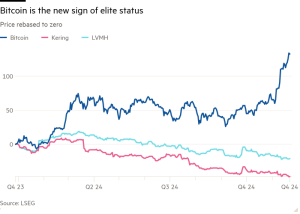NHS £25bn Budget boost puts pledge of ‘no cash without reform’ to test

Unlock the Editor’s Digest for free
Roula Khalaf, Editor of the FT, selects her favourite stories in this weekly newsletter.
The announcement of billions of pounds in additional funding for the NHS in the Budget has raised questions about the wisdom of pouring yet more money into a faltering system without a clear blueprint for change.
UK chancellor Rachel Reeves’ injection of a £22.6bn rise in the day-to-day budget of the NHS over two years, and a £3.1bn increase in capital spending, this week seemed to fly in the face of Labour’s insistence that investment must be preceded by reform.
A 10-year plan for the NHS, intended to spell out how the health service will shift more care out of hospitals and into the community, as well as taking it from “analogue to digital”, will not be published until the spring.
For decades, the Treasury has viewed the NHS with suspicion, believing it has not always secured value for money as successive administrations have responded to a political imperative to protect the health budget even through times of sharp fiscal austerity.
Wes Streeting, health and social care secretary, told the BBC this week he would be asking “hard questions” of the NHS in England to ensure the extra £25bn over two years was spent wisely.
“We’ve got to make sure that the investment the chancellor has committed to the NHS is linked to reform,” said Streeting.
“We owe it to patients to deliver great care and crucially to taxpayers to deliver value for money.”
Victoria Atkins, shadow health secretary, said: “Taxpayers have been saddled with the highest tax burden in our country’s history with no idea what we’re paying for.”
But Max Warner, a research economist at the Institute for Fiscal Studies think-tank, who has studied productivity in the NHS, disputed the notion that the extra funding had come entirely without preconditions.
He pointed to the obligation on health, like other Whitehall departments, to deliver 2 per cent efficiency savings in the next financial year. He acknowledged, however, that these “kind of numbers have been talked about in the past and not necessarily been achieved, but still there is always a bit more money for the NHS”.
However, Warner, questioned whether the capital spending allocated in the Budget — a rise averaging around 11 per cent in real terms between 2023-24 and 2025-26 — would pay off in additional activity immediately.
“Just increasing capital budgets doesn’t automatically mean you’re going to spend that money well, or even spend it at all,” he said, warning that sums could wind up being transferred to cover day-to-day spending.
He also noted it could take time to build a new hospital or improve the crumbling health service estate, although increased spending on technology might have a quicker impact.
Nick Davies, a programme director at the Institute for Government, said he had not expected the government to have fully-fledged reform plans at this stage, and had expected more funding would have to be given for an early “firefighting” budget.
However, a framework of accountability, aligned with Labour’s objectives for the service, would ultimately be needed if the money was to deliver the necessary transformation, he argued.
When Tony Blair’s Labour government sought to repair the NHS after a long period of Tory rule, huge additional investment was contingent on NHS leaders meeting tight performance metrics on the maximum time patients should wait for treatment, a regime famously dubbed “targets and terror”.
Starmer’s government has said it wants to achieve targets that have not been met for close to a decade, that patients should wait no longer than 18 weeks to start non-urgent hospital treatment or four hours in A&E by the end of the parliament.
But Davies said this would be “really difficult, and it’s not clear how they are going to reconcile that with their objectives to make care more preventative and move care out of hospitals”.
Matthew Taylor, chief executive of the NHS Confederation, which represents health managers, said: “The reality is that nearly all the money announced is needed simply to keep the show on the road. They had to put that much into the day-to-day.
“If you didn’t, then you could be forced to reduce activity in the health service taking the government further away from its manifesto commitments,” he added.
Government officials this week insisted that “every bit of investment is linked to reform”.
They added that more detail would be announced over the coming weeks, but priorities included measures aimed at cutting waiting lists and investing in tech and capital to improve productivity.
Data visualisation by Amy Borrett
#NHS #25bn #Budget #boost #puts #pledge #cash #reform #test







